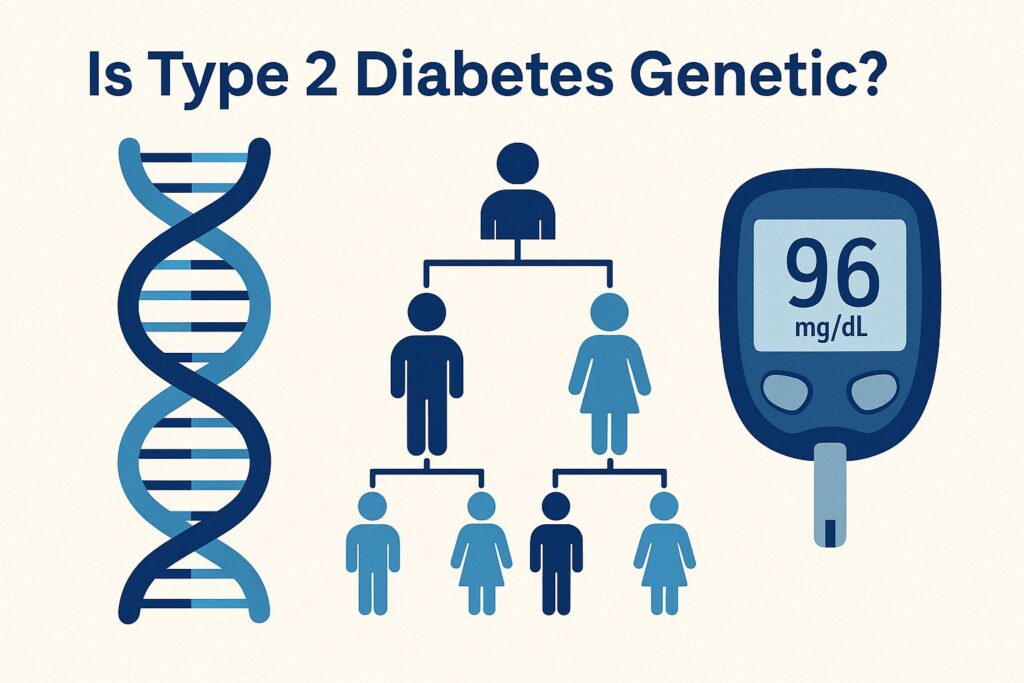Imagine this: your father was diagnosed with Type 2 diabetes in his late 40s. Now in your 30s, you’re beginning to wonder—“Will I develop it too?”
If this question has ever crossed your mind, you’re not alone. Type 2 diabetes is one of the most common chronic conditions worldwide, and its link with family history is a growing concern. But does having a parent with diabetes guarantee you’ll develop it? The answer is more nuanced than a simple yes or no.
As a licensed pharmacist, I’ve counseled many individuals who are genetically predisposed yet manage to prevent or delay diabetes through lifestyle changes. In this article, we’ll explore the science behind the genetic risk of Type 2 diabetes, how lifestyle interacts with your DNA, and what you can do if you’re at risk.
What Is Type 2 Diabetes?
Type 2 diabetes is a chronic condition characterized by the body’s inability to use insulin effectively—a state known as insulin resistance. Unlike Type 1 diabetes, where the immune system destroys insulin-producing cells, Type 2 is largely influenced by environmental and genetic factors.
Over time, the pancreas can’t keep up with the insulin demand, leading to elevated blood glucose levels. Left unmanaged, this can cause complications affecting the heart, eyes, kidneys, nerves, and more.
🔗 Related Post: Type 1 vs Type 2 Diabetes – Key Differences Explained
Is Type 2 Diabetes Genetic? What the Science Says
Yes—Type 2 diabetes has a strong genetic component, but it’s not solely determined by your DNA.
Heredity vs Genetics
• Heredity refers to traits passed from parents to offspring.
• Genetics delves into how specific genes influence conditions like diabetes.
Research shows that people with a first-degree relative (parent or sibling) with Type 2 diabetes have a significantly higher risk. This doesn’t mean you’re destined to develop it, but your genetic makeup can influence:
• How your body responds to insulin
• Fat metabolism
• Appetite regulation
• Inflammation levels
Key Genetic Variants
Certain gene variants are associated with a higher risk of developing Type 2 diabetes. The most studied include:
• TCF7L2: Linked to impaired insulin secretion.
• SLC30A8: Affects beta-cell function.
• PPARG: Plays a role in fat storage and glucose metabolism.
Further Reading:
CDC – Is Type 2 Diabetes Genetic?
NIH Study – The Genetic Architecture of Type 2 Diabetes
Family History and Diabetes Risk
The risk of developing Type 2 diabetes increases dramatically if family members have the condition:
| Family Member | Increased Risk |
| One parent | 40% |
| Both parents | 70-80% |
| Identical twin | up to 90% |
Family history doesn’t just share genes—it often shares lifestyles: eating habits, physical activity patterns, and even stress responses.
Genes Alone Aren’t Destiny — Lifestyle Still Matters
Here’s the empowering truth: genes load the gun, but lifestyle pulls the trigger.
Even if you’re genetically predisposed, your environment plays a critical role in whether those genes are expressed.
Modifiable Risk Factors:
• Obesity and belly fat: Increase insulin resistance.
• Sedentary lifestyle: Leads to poor glucose utilization.
• Unhealthy diet: Refined carbs and sugary beverages worsen glycemic control.
• Chronic stress: Raises cortisol and blood glucose levels.
• Poor sleep: Alters insulin sensitivity.
Read More: Morning Habits That Help Lower Blood Sugar Naturally
Epigenetics: The Bridge Between Genes and Environment
Epigenetics is the study of how external factors influence gene expression—essentially turning genes “on” or “off.” A healthy lifestyle can help suppress harmful genes and activate protective ones.
How to Know If You’re at Genetic Risk
Red Flags for Inherited Risk:
• One or more close relatives with Type 2 diabetes
• Belonging to high-risk ethnic groups (South Asian, African, Hispanic)
• Overweight or obese, especially with abdominal fat
• History of gestational diabetes or PCOS
• Diagnosed with high blood pressure or cholesterol
Should You Get Genetic Testing?
Currently, genetic testing for diabetes risk isn’t standard in clinical practice. But understanding your family history remains one of the most valuable predictors.
Can You Prevent Type 2 Diabetes If It Runs in Your Family?
Absolutely! Even with a strong family history, you can delay or completely prevent Type 2 diabetes through early interventions.
Evidence-Based Prevention Tips:
• Lose 5–10% of your body weight if overweight.
• Engage in 150 minutes of physical activity per week (walking, swimming, strength training).
• Eat a high-fiber, low-GI diet (oats, lentils, leafy greens, berries).
• Get regular screenings: HbA1c, fasting glucose.
• Avoid smoking and limit alcohol.
Get Started: 28-Day Diabetic Diet Plan (Pharmacist Approved)
Role of Pharmacists in Prevention
Pharmacists can offer counseling on:
• Blood sugar monitoring devices
• Nutritional supplements (like berberine or magnesium)
• Lifestyle coaching and medication guidance for prediabetes
Genetic vs Lifestyle Contribution to Type 2 Diabetes
| Factor | Estimated Contribution |
| Genetics | 30-40% |
| Lifestyle/Environment | 60-70% |
Conclusion: What You Can Take Away
Yes, Type 2 diabetes has a genetic component—but it doesn’t mean you’re powerless.
With the right combination of knowledge, early detection, and lifestyle changes, you can reduce your risk significantly, even if diabetes “runs in your family.”
So, don’t wait for a diagnosis. Take charge today.
Use Our Free Tool: AI-Powered Diabetic Diet Planner – Personalized in Seconds
FAQs
Can you get Type 2 diabetes even if no one in your family has it?
Yes. While genetics increase risk, lifestyle factors alone can also cause diabetes in people with no family history.
Is there a genetic test to predict Type 2 diabetes?
Some genetic tests exist but are not commonly used in clinical practice. Family history and lifestyle assessments remain the best indicators.
If my parents have diabetes, will I definitely get it?
No. You may have a higher risk, but healthy habits can prevent or delay onset.
Is Type 2 diabetes more influenced by genetics or lifestyle?
Lifestyle has a larger impact. Genetics may predispose, but environment and daily choices play the dominant role.
References & Resources
• CDC – Genetics and Diabetes
• American Diabetes Association
• NIH – Heritability of Type 2 Diabetes
• WHO – Diabetes Fact Sheet



